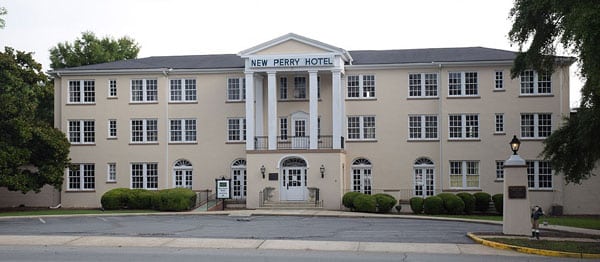
August 27, 2018; Telegraph (Macon, GA)
Too often, school systems focus on getting special education students through their studies and, if all goes well, presenting them with high school diplomas. What happens after that often depends on family support, nonprofit agencies, and the individual abilities (and disabilities) of each graduate. A group of special-ed teachers in Perry, Georgia has a vision to create post-graduation housing and work opportunities for their students by acquiring and modifying a long-vacant hotel property. But their innovative plan is now caught up in a recent city council zoning decision that just might have been passed in response to the proposed project.
The HALO Group, a nonprofit started by local special education teachers frustrated with the lack of available job opportunities for their students, is under contract to purchase what is described in the Telegraph as “Perry’s most iconic building,” a three-story hotel on Main Street built in 1925 but still known as “the New Perry Hotel.” The plan is to build 14 apartments in a “motor court” behind the main building where developmentally disabled adults could live independently. The hotel’s restaurant would be renovated and reopened, providing job training and skills-appropriate jobs for those living in the apartments and others. Over time, the hotel itself might be reopened. As described on the organization’s website, the project is intended to be “an educational, vocational and residential program serving our Special Needs Adult community.”
Sign up for our free newsletters
Subscribe to NPQ's newsletters to have our top stories delivered directly to your inbox.
By signing up, you agree to our privacy policy and terms of use, and to receive messages from NPQ and our partners.
HALO fully expects the sale to go through by the contract date of September 24th. But what happens after that may be slowed down or altered by a recent city council decision that requires a special exception to a zoning amendment for any new apartment projects with more than six units. The amendment requiring this exception was announced not long after the HALO plan was unveiled, and HALO leaders believe it was aimed squarely at them. Mayor Jimmy Faircloth insists the timing was coincidental, if “unfortunate,” and instead was in response to a rumor about plans for a large apartment complex near a residential neighborhood. (Of course, if that is the case, then the City Council could vote to approve a variance for the HALO plan).
Regardless, the nonprofit could still move forward with six apartment units if the sale goes through and they do not receive a variance. But as HALO board member and local businessman Gary Martin observes, the model proposed by the nonprofit has a chance to succeed in bringing the historic hotel property back to life—where for-profit attempts have failed—because of grants, donations, and other types of assistance that could be generated.
NPQ will keep an eye on this story, in the hopes that a bureaucratic move with at least a slight whiff of NIMBY about it may in time give way to a successful model that benefits all of Perry’s citizens and sets an example for other towns to follow.—Eileen Cunniffe













